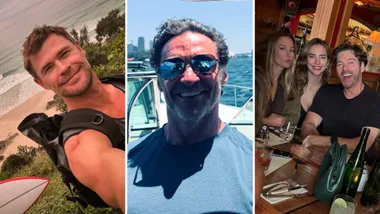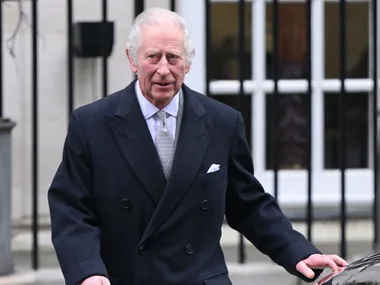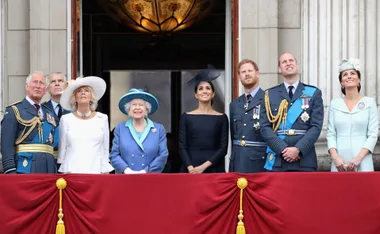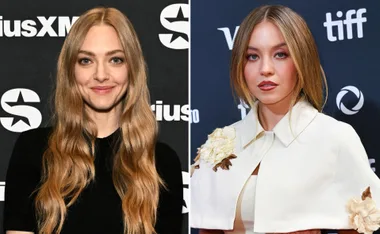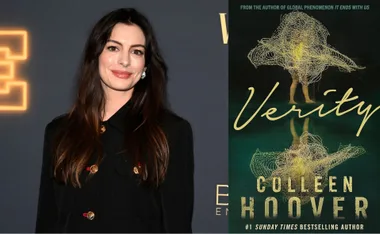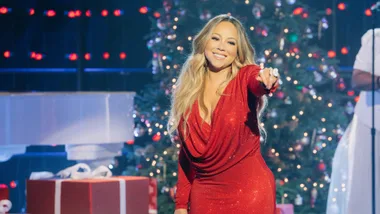Q & A with Ian Bone, author of The Song Of An Innocent Bystander, the September Book Of The Month in The Australian Women’s Weekly (Penguin Books, $18.95). The plot takes off like a runaway train, when nine-year-old Freda Opperman is separated from her parents at a fast food outlet and is caught up in a terrifying siege.
Q Am I correct in saying that this is your first adult book, having written, about 13 books for children and teenagers?
A In writing the book I wanted to push the boundaries as it were, towards writing for more of an adult audience. I have to say, I also believe that a lot of young adult books have a lot of appeal for adults as well.
Q You’ve had 13 books published?
A It’s probably more like 20, but because that includes four Bananas In Pyjamas and four Wiggles books, it sounds like a bit of a brag.
Q Did writing for television come before writing books?
A Yes. Television was my first love, although as a kid I read a lot. I was a bit of a sophisticated reader. I was reading people like Herman Hess and people like that. I went to the Australian Film and Television School, and graduated from there.
Q What was you first job in TV?
A First, it was making little educational films then I went straight into Playschool. And I did Playschool for over three years, when Noni Hazlehurst was still doing it.
Q So did you start writing books while you were still in TV?
A Yes, I was making TV for the ABC, working on this show called Swap Shop, dramatising short stories and with the arrogance of ignorance, I said “I can do this” and I had a go at it. And everyone said, ‘Well, these are pretty good.’ As much as I enjoyed working for the ABC – I was there till 1993 – I found I was spending all my nights writing these books. I wrote five that never got published. I realised that something had to go and I was even starting to think television was beginning to take away from my writing.
So I made a decision, either brave or foolish, to go. I had an enormously supportive partner, I must point out. So I left my job at the ABC and became an author. It was huge because I’d won national and international awards for TV programs. I’d reached a point at the ABC where I would either have had to go into middle management or change direction in some shape or form, but that wasn’t the move I wanted to make.
The popular story is that it happens overnight. For most people it doesn’t. I have a nice collection of rejection letters.
Q Did you keep them?
A I have a little box in my garage. It’s gathering dust, but there they all are.
Q You didn’t perceive it as a great setback when you were rejected?
AIt spurred me on actually. For half an hour or so it felt like…’Oh, God, this is horrible’. But it would actually spur me on and make me think I can do better. The first time I really wrote for myself was when I wrote a book called Fat Boy Saves The World, which was published by Lothian. I put aside all notions of what would make a good book. In fact I looked at all the books for young adults and teenagers and said, ‘I want to write something completely different.’
What was important about it with regards to my writing was that in the book I asked things about what is the value of life? What is love? I explored the other side of life other than getting on with work or boys or girls or whatever, I went deeper and addressed the spiritual aspect of life. That book appeals to a lot of adults as well as to younger people.
Q The plot of The Song of An Innocent Bystander is fabulous – how did you come across the idea?
AIt came from a few areas. I had been talking to someone a few years ago about parents who exert a very powerful influence on their children, to the point of almost brainwashing them. Around the same time there had been a siege in an aeroplane where people had been held hostage for quite a number of days. And I remember reading one of the accounts of one of the Australians involved, talking about the various reactions of the people on the plane and how some people had fallen into the Stockholm Syndrome, which is where a person being held captive will start aligning themselves with the person holding them. It’s a documented and recognised response. Then I remembered the Patti Hearst story, which I grew up hearing and I re-read her book. But really the initial idea came form that conversation about children and how they can be so taken in by the strong world around them or by any strong ideology. How they need to cling to something. It can be anything because they are not as discerning as we are. So it grew from that.
To me a nine-year-old girl is the perfect person, because she was old enough to look after herself, but young enough to be taken in by what was being said and what was going on around her. To be affected by a whole lot of messages both said and unsaid.
Q I was impressed by the rising tension and terror you re-create during the siege. I found it very gripping and found myself wondering if you’d ever been a hostage – or did you get someone to tie you up in a room for three days?
A There have been brief moments in my life where I have experienced fright, but no, I’ve never been a hostage. I remember one incident when my wife and I were chased by these young guys, who chased us to our car and smashed the windows as we drove away. So you draw on things like that. I read first-hand accounts of people who had been involved in sieges. I might be old-fashioned, but I think authors, good ones, can imagine themselves into any situation. I wanted to recreate that real feeling of the stale terror of the place, of being held by this capricious madman. And the responses people will have that are not always predictable.
Q How did you choose the name Freda?.
A I can’t write a book until I have the character’s names . Not a word, it’s crazy. So I sit, sometimes for days, wondering and fiddling around with names. I can’t tell you anything logical about where that name came from, but when I got it I said, ‘That’s her, that’s her!’ Once I get the name right, the character starts to form in my mind. started writing the book about three years ago. I do a lot of other writing as well. I still write for TV, I can’t get away from the monster. Believe it or not, I write Here’s Humphrey. I also write a lot of video scripts. I have been working for a production company on a pilot of a TV min-series about a mass murderer, with a twist, but I can’t say any more about that right now.
Q By writing for Humphrey, who doesn’t speak a word, do you mean that you set up scenes for him?
A No, everything is fully scripted. Then the actor interprets it as Humphrey. He acts out the lines. I do talks about Humphrey to school kids and the best question I ever had was from a kid at Coober Pedy who asked: “Have you ever been inside Humphrey?” And there was just this beat and then the whole room erupted in laughter. I said, If you’re referring to his suit, I’ve never been inside it.
Q So Humphrey is your bread and butter while you’re writing books?
A Yes, but it’s also enormous fun writing Humphrey. I really love writing Humphrey, I really do. It’s just Laurel and Hardy for pre-schoolers. He has simple motivations really. He just wants to sing and dance and have fun.
Q What about the book’s title?
AIt took me a while. I can write without my title – but I do like to get my titles tied down fairly early. It was always going to be about an innocent by-stander.
Q How did you get the book published? Did you send early chapters, or a finished manuscript or what?
A I approached Penguin Books. I took the first few chapters to Laura Harris at Penguin Books. And I hadn’t had anything published with Penguin at that stage. I asked her what she thought of it and she fell in love with it straight away. It was about the first 50 pages of the book, really.
Q Are you writing another book for the adult market?
A Most definitely, I have one in mind already. Called Love Cuts. It’s about six characters all in their early 20s and it’s told as six short stories, from each of the character’s perspective. So there’s a continuing story through it. They’re all friends and they all know each other. It’s an exploration of the different forms of love, which has been done before, but it’s something I want to try. There’s fidelity, devotional love, devoting yourself to one person through really tough times, romantic love and unrequited love. So that’s what I am going to work on next.
Q Is Penguin publishing that one?
AYes, I have a two-book deal with them.
Q You were born in Geelong.
AYou can take the boy out of Geelong, but you can’t take Geelong out of the boy. I grew up there, did my paper rounds as a lad.
Q So you’re still a Cats supporter?
A Oh yes, absolutely.
Q What did your parents do for a living?
A Dad was a factory worker at Ford. My mum was a secretary. I come from a family of five. I have a twin sister. We were the last, so I have two older brothers and an older sister.
Q Does your twin sister write?
A No she’s a legal secretary. I’m the only one who writes. I was always regarded as the crazy one.
Q Why did you move from Victoria?
A I went to Sydney to go to the Film and Television School. And graduated there in 1982, after three years. Then I worked for the ABC. Left it in ’93, but in that time we had left Sydney in 1989 to go to Adelaide. Sydney was getting tougher and tougher. We loved it, but we felt it was a place for young people, unencumbered with kids. My wife is from Adelaide originally. Adelaide is such an easy city to live in. Every time I go back to Sydney, it reminds me of how easy we’ve got it. Everything’s there, but on a much smaller scale.
Q Educated at?
A Belmont High School, then Rusden Teacher’s College, then three years at the Film and Television School.
Q How long have you been married?
A Oh gosh… my son is 16, we got married after he was born, so for about 15 years, I guess. I have a 16-year-old son, Jack, a 12-year-old daughter called Elinor and a six-year-old daughter called Bridie. And a golden retriever called Louis.
Q Describe your living surrounds.
A We live in suburban Adelaide, in a sandstone bungalow which was built in the 1920s. The ghost of the original owner used to come and visit us, but he seems to have left now.
Q A real ghost?
A Yes, we used to see him in his pyjamas and dressing gown. He was wonderful. The garden is beautifully done by my wife, Liz. I dig holes now and then, that’s my only contribution.
Q Tell me about your wife?
A Her name is Liz. She’s a social worker. She works 3 days a week, and on those days I do the pick-up and drop-offs of the kids to school.
Q Where do you write?
AI work in a shed down the back garden. I’ve had it for a year now. Prior to that, I was in a corner of lounge-room and that was a bit tough, I can tell you. So I built a little shed, but it’s got everything I need. A perfect little quiet space away from everything that goes on.
Q Do you have a view?
A No, I don’t want a view. I liked to be totally locked in my own little cave, in my own world.
Q Do you have set hours for writing?
A Usually, if I’m not doing the school drop-off, I get out there about 8am and come in around 5.30-6.00pm. For lunch, I just grab a sandwich and keep going. If you’re working on something like this book you can’t just turn it off. So often, at night, I’ll write in a note book or if it’s winter, I’ll continue working on my laptop.
Q Are you a distracted father and husband when you’re working on a book?
A My family say that when I’m working on something like this, I can be. But mostly, I can’t be. I go every Thursday to my younger daughter’s violin lessons and I do all the talking to the mums at the pick-ups and drop-offs. I get distracted when I’m working, but I much prefer that people know me as Bridie’s dad rather than that Ian Bone who was in the paper. My dad was a shift worker so he was actually around during the day and worked at night, but he was always the one at home when we’d arrive from school and he’d get the meals, so I grew up with him as a role model.
Q How old are you?
A I was born in 1956, so I will be 46 in October.
Q Star sign?.
A Libran. But I don’t know if I’m typical because everyone says theyre indecisive and I’m the most decisive person I know.
Q Looking back on leaving the ABC to become a writer, that was a huge gamble, wasn’t it?
A It was enormous. Around the books that I write I do a lot of freelance work, Humphrey etc. And I always try to keep that sustained because I do have a family. I keep emphasizing that I couldn’t have done it without my partner. I just think I’m the luckiest person around.
Q Her regular income helped?
A Well, that too, yes, but to have someone who would say then if that’s your dream, then go for it. Her attitude was that we could make it happen. That was wonderful, because a bloke’s programmed to be responsible.
Q Were there lean times?
AOh hell, yes. I nearly gave it away twice. When I wasn’t getting published, there were times when the financial stuff was difficult, like we’ve learned how to stretch that noodle. But other times, especially earlier on when I was getting manuscripts rejected and I wasn’t getting what I wanted to happen in terms of a breakthrough in getting a book published, I thought, ‘I’m just wasting my time’. It was ‘93 when I started writing full time, but it wasn’t until ‘98 that my book Fat Boy was published. To me, that’s when I started to feel like it was really going to happen. There were about four years there when I just kept at it and at it and at it. I wasn’t starving, but it wasn’t happening. I set myself goals and I felt I’d failed in the sense that I hadn’t achieved them. So I had to overcome that sense that I’d failed. That I hadn’t done what I’d said I’d do, that I was wasting time. I had to continually struggle with that voice in my head for quite a long time. Since ‘98 I’ve had high success.

